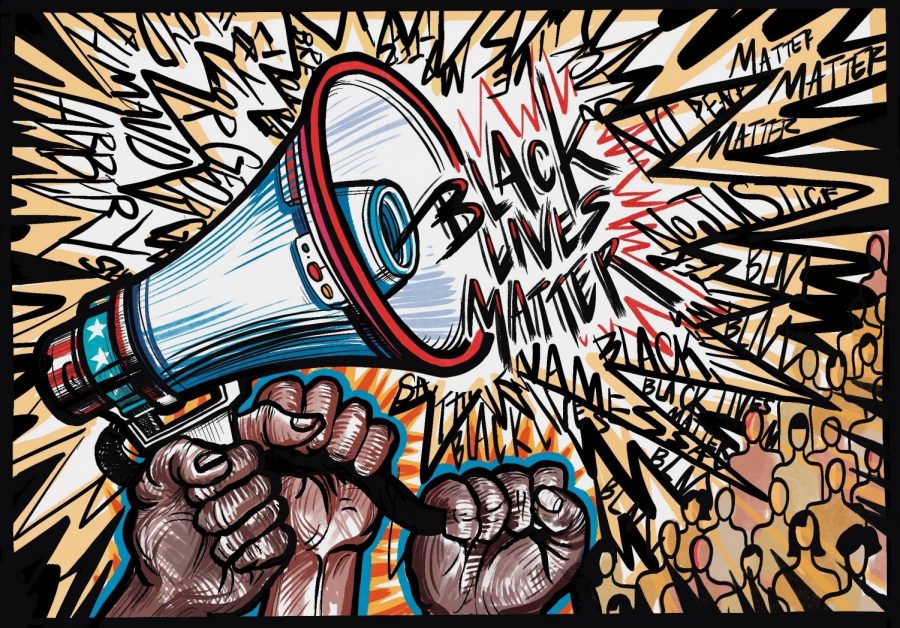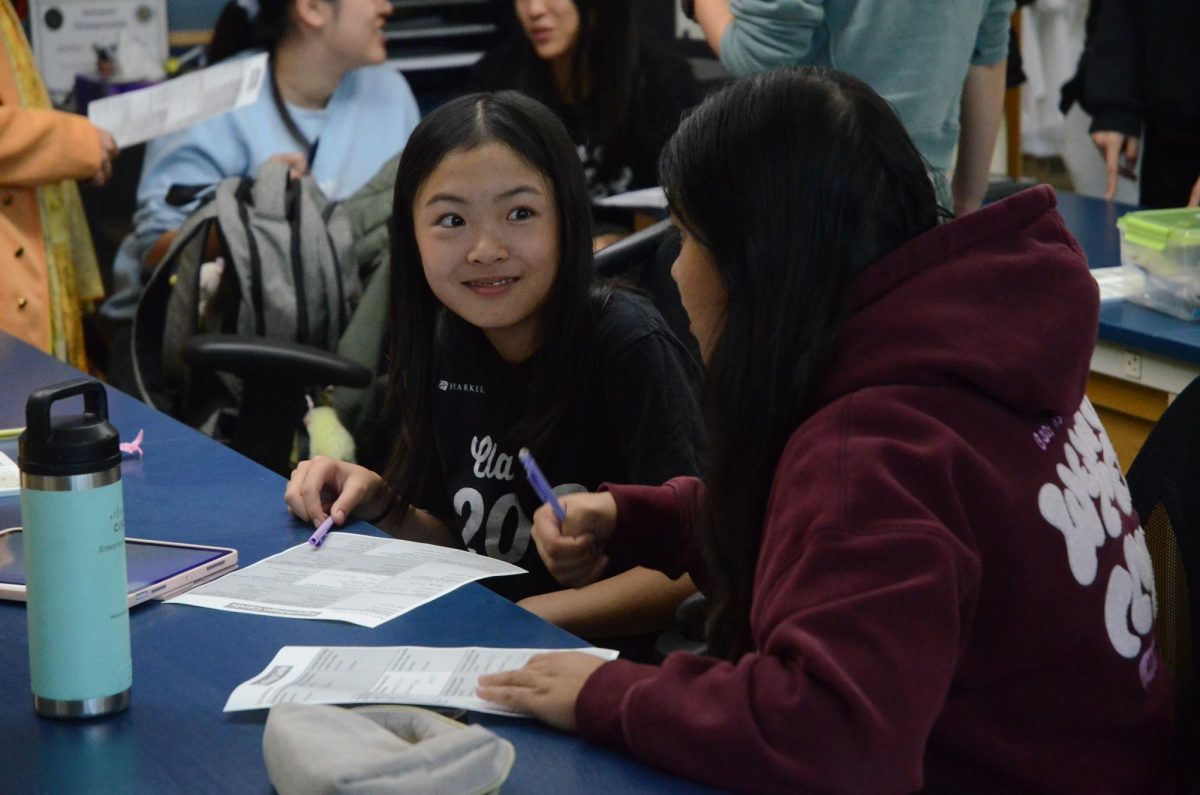Editorial: Say their names — and listen
This illustration depicts how the country has reached a flashpoint. The African American community is speaking out against systemic racism and police violence, across the nation and in the Harker community, too.
June 14, 2020
Say their names.
Tony McDade. Breonna Taylor. Ahmaud Arbery. Eric Garner. Rodney King. Tamir Rice. And so many more African American men and women — most unpublicized, many minors — have been killed by the police in this country.
Black lives matter.
Yet this country continues to systemically oppress African Americans, especially through law enforcement practices and policies. African Americans represent 13% of the population of the United States but 24% of the people police killed in 2019. Since 2015, police have fatally shot 1,293 African Americans.
With the killing of George Floyd by a Minneapolis police officer on May 25, the country has reached a flashpoint.
The African American community is speaking, but the responsibility to listen and to learn about the systemic racism faced by African Americans falls on all Americans. African Americans do not bear the burden of teaching other Americans about ongoing discrimination.
We, the Harker Journalism program, stand and will continue to stand in solidarity with the African American community and the voices that have too long gone unheard.
Racism is not an artifact of the past. It persists now, as shown blatantly through these killings — acts of police violence. Yet racism also lives quietly and daily through implicit biases and small actions — and it exists within the Harker community, too.
In interviews with Harker journalism conducted over the past two weeks, students and alumni of color stated that they have each heard the n-word repeatedly in casual conversation with other Harker students. A student joked with an African American student in a non-classroom setting about how much they would be worth at a slave auction, going as far as to look up the amount in today’s currency. An African American alumnus said that classmates would repeatedly ask if they did drugs, sold drugs, knew where to obtain drugs or were affiliated with gangs.
We are Harker journalists, but we are students, too. To hear fellow students and alumni tell us that these racist actions are happening on our campus right now is upsetting to us, because it should upset everyone. Change needs to happen now, both in our community and across the nation.
One path to address systemic racism is to hold open discussions. The schoolwide Solidarity and Fellowship Vigil organized by the Harker Diversity, Equity and Inclusion Committee last Thursday, which saw around 250 students and faculty come together to express their emotions about racial inequity, was an important first step.
The committee is holding two upcoming town halls for the community to discuss Harker’s diversity and mission: one on Tuesday from 6-7:30 p.m. for all staff and grade 6-12 students, and one on Wednesday at the same time for parents and alumni.
Harker journalism also needs to change to be more reflective of our community. There are no African Americans on our staff, nor have there been any African Americans on our publications in all the time that our current staff has been at the upper school. We are going to work on this. We commit to becoming better allies and listeners.
Our content needs to address and spotlight racism, both in our community and nationally. As we aim for more equity in our coverage, we invite feedback to hold ourselves accountable and foster the necessary discussions.
Our community has begun the difficult conversations — now, they must continue. Our advocacy, involvement and activism must transcend this moment.


















![“[Building nerf blasters] became this outlet of creativity for me that hasn't been matched by anything else. The process [of] making a build complete to your desire is such a painstakingly difficult process, but I've had to learn from [the skills needed from] soldering to proper painting. There's so many different options for everything, if you think about it, it exists. The best part is [that] if it doesn't exist, you can build it yourself," Ishaan Parate said.](https://harkeraquila.com/wp-content/uploads/2022/08/DSC_8149-900x604.jpg)




![“When I came into high school, I was ready to be a follower. But DECA was a game changer for me. It helped me overcome my fear of public speaking, and it's played such a major role in who I've become today. To be able to successfully lead a chapter of 150 students, an officer team and be one of the upperclassmen I once really admired is something I'm [really] proud of,” Anvitha Tummala ('21) said.](https://harkeraquila.com/wp-content/uploads/2021/07/Screen-Shot-2021-07-25-at-9.50.05-AM-900x594.png)







![“I think getting up in the morning and having a sense of purpose [is exciting]. I think without a certain amount of drive, life is kind of obsolete and mundane, and I think having that every single day is what makes each day unique and kind of makes life exciting,” Neymika Jain (12) said.](https://harkeraquila.com/wp-content/uploads/2017/06/Screen-Shot-2017-06-03-at-4.54.16-PM.png)








![“My slogan is ‘slow feet, don’t eat, and I’m hungry.’ You need to run fast to get where you are–you aren't going to get those championships if you aren't fast,” Angel Cervantes (12) said. “I want to do well in school on my tests and in track and win championships for my team. I live by that, [and] I can do that anywhere: in the classroom or on the field.”](https://harkeraquila.com/wp-content/uploads/2018/06/DSC5146-900x601.jpg)
![“[Volleyball has] taught me how to fall correctly, and another thing it taught is that you don’t have to be the best at something to be good at it. If you just hit the ball in a smart way, then it still scores points and you’re good at it. You could be a background player and still make a much bigger impact on the team than you would think,” Anya Gert (’20) said.](https://harkeraquila.com/wp-content/uploads/2020/06/AnnaGert_JinTuan_HoHPhotoEdited-600x900.jpeg)

![“I'm not nearly there yet, but [my confidence has] definitely been getting better since I was pretty shy and timid coming into Harker my freshman year. I know that there's a lot of people that are really confident in what they do, and I really admire them. Everyone's so driven and that has really pushed me to kind of try to find my own place in high school and be more confident,” Alyssa Huang (’20) said.](https://harkeraquila.com/wp-content/uploads/2020/06/AlyssaHuang_EmilyChen_HoHPhoto-900x749.jpeg)











